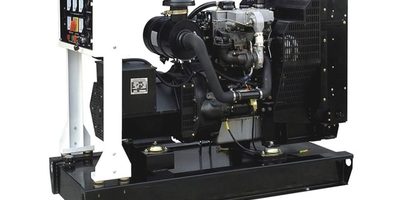Diesel Generating Set is a combination of a diesel engine and an alternator. Diesel engine is the prime mover, which drives an alternator to produce electrical energy. In the diesel engine, air is drawn into the cylinder and is compressed to a high ratio (14:1 to 25:1). During this compression, the air is heated to a temperature of 700–9000˚C. A metered quantity of diesel fuel is then injected into the cylinder, which ignites spontaneously because of the high temperature. Hence, the diesel engine is also known as compression ignition (CI) engine. DG set can be classified according to cycle type as: two stroke and four stroke. However, the bulk of IC engines use the four stroke cycle. Types of fuel or energy used in DG sets are Furnace oil and diesel.
Design & Operation
A diesel generating set should be considered as a system since its successful operation depends on the well-matched performance of the components, namely:
- The diesel engine and its accessories.
- The AC Generator.
- The control systems and switchgear.
- The foundation and power house civil works.
- The connected load with its own components like heating, motor drives, lighting etc.
It is necessary to select the components with highest efficiency and operate them at their optimum efficiency levels to conserve energy in this system.
To make a decision on the type of engine, which is most suitable for a specific application, several factors need to be considered. The two most important factors are: power and speed of the engine. The power requirement is determined by the maximum load. The engine power rating should be 10-20 % more than the power demand by the end use. This prevents overloading the machine by absorbing extra load during starting of motors or switching of some types of lighting systems or when wear and tear on the equipment pushes up its power consumption.
An engine will operate over a range of speeds, with diesel engines typically running at lower speeds (1300 – 3000 RPM). Speed is measured at the output shaft and given in revolutions per minute (RPM). There will be an optimum speed at which fuel efficiency will be greatest. To determine the speed requirement of an engine, one has to again look at the requirement of the load. For some applications, the speed of the engine is not critical, but for other applications such as a generator, it is important to get a good speed match. If a good match can be obtained, direct coupling of engine and generator is possible; if not, then some form of gearing will be necessary – a gearbox or belt system, which will add to the cost and reduce the efficiency.
There are various other factors that have to be considered, when choosing a diesel engine for a given application. These include the following: cooling system, abnormal environmental conditions (dust, dirt, etc.), fuel quality, speed governing (fixed or variable speed), poor maintenance, control system, starting equipment, drive type, ambient temperature, altitude, humidity, etc. Suppliers or manufacturers literature will specify the required information when purchasing an engine. The efficiency of an engine depends on various factors, for example, load factor (percentage of full load), engine size, and engine type.
How Diesel Generator Works?
The diesel generator is an equipment whose use is indicated for applications that require more power and for continuous operation. They convert the fuel into electrical energy, through the combustion of diesel.
This type of fuel, compared to others like gasoline, for example, is burned at a higher temperature, hence more efficient and ensure greater power to the generator. Diesel generators require regular maintenance to function properly.
In general, how does a diesel generator work?
- First, air is blown into the generator until it is compressed;
- Subsequently, diesel fuel is injected;
- The combination of these processes, air compression and subsequent injection of the fuel, will contribute to generate the (intense) heat that triggers the inflammation of the fuel. In this way, it starts combustion and causes the generator to start up.
- Thus, the generator starts to produce the necessary electrical energy to be distributed according to the needs of the equipment connected to it or the place / space that it will supply.
It should be noted that diesel generators can be used extensively, can be switched on for hours, weeks, or simply until the main power returns. For this you must make sure that it is properly stocked so that it can fulfill its function.
As this type of generator is in operation for longer periods, it necessarily entails regular maintenance so that it can verify that all the components are in full operation.
It is important to pay attention to the engine of the generator, to maintain it and to lubricate it, since it will run continuously for hours on end and needs this care to maintain its efficiency.
Diesel generators are a type of generator that has announced the advantage of being more economical and are suitable for cases where the main premise is a power supply for failures and with high efficiency for high powers such as the case of large industries.
On the other hand, diesel is also interesting because it is a fuel that ensures a better performance, which is extremely important, in these cases, where efficiency is a requirement. It will be the diesel that will be responsible for triggering the generator, thus initiating the combustion of the fuel.
This action causes the central axis to move, causing the mechanical energy to transform into electric, with the aid of the alternator, putting the diesel generator in operation.


